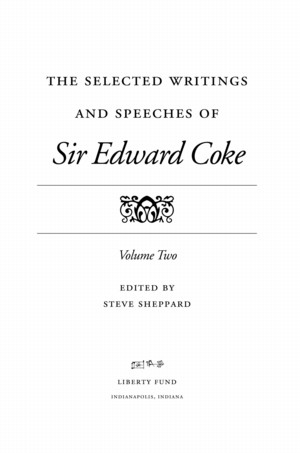
Part of: Selected Writings of Sir Edward Coke, 3 vols. Selected Writings of Sir Edward Coke, vol. II
- Steve Shepherd (editor)
- Sir Edward Coke (author)
Vol. 2 of a 3 vol. set of The Selected Writings. This volume contains Coke’s Speech at Norwich, excerpts from the small treatises, and excerpts from the 4 parts of the Institutes.
Key Quotes
Law
Upon this Chapter [29], as out of a roote, many fruitfull branches of the Law of England have sprung… This Chapter containeth nine severall branches.
That no man be taken or imprisoned, but per legem terrae, that is, by the Common Law, Statute Law, or Custome of England; for these words, Per legem…